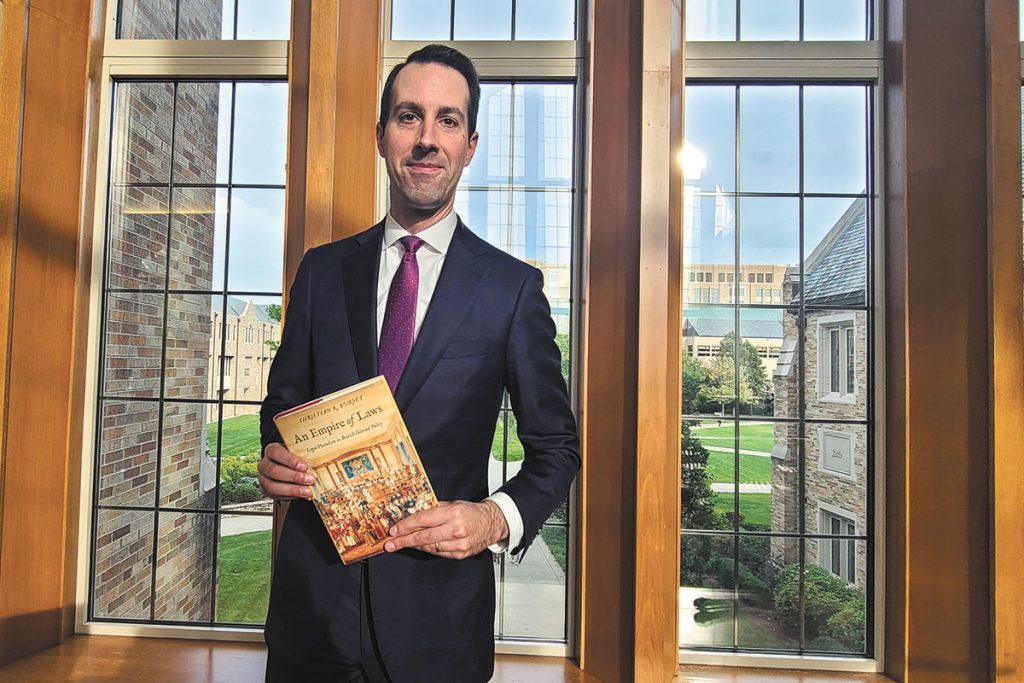Subscriber Benefit
As a subscriber you can listen to articles at work, in the car, or while you work out. Subscribe Now
Publishing a book is a feat of its own, but for University of Notre Dame Law School Professor Christian Burset, that feat was more than a decade in the making.
Burset’s book that published Sept. 26, “An Empire of Laws: Legal Pluralism in British Colonial Policy,” is the first empire-wide overview of law looking at the laws of the 18th century British Empire.
“There’s a feeling of great relief to see it out in the world and be able to share all of my research and all the effort I put into it with a wider public,” Burset said.
Path to publication
Burset first began working on the book as his Ph.D. dissertation at Yale University in 2009.
It all started when he was looking for inspiration in the Rare Book & Manuscript Library at Yale and came across a letter from a British official in India to a relative in England. The letter described the way cases were adjudicated back then.
Burset gave the example of someone grabbing a hot iron and then looking to see how the wound healed to see if the subject was telling the truth or not.
“It’s pretty clear that this official thought that ordeals were an insane way to adjudicate cases,” Burset said. “But it was also clear to me that he thought it was really important that it be done correctly.”
Burset began to wonder why someone who thought such a practice was insane to begin with would put effort into making sure it was done right. So, he let his curiosity lead him to answering some of his questions.
He describes his book as challenging the story most know by offering a new account of Britain’s imperial legal policy in the 18th century. He argues that the shape of Britain’s imperial law and the colonial institutions more generally were often a deliberate policy choice.
For many years, Burset said, Britain attempted to impose its own laws on the peoples it conquered, and the English common law usually followed the Union Jack. But the common law became less common after Britain came out of the Seven Years’ War in 1763 as the world’s most powerful empire.
The book was published by Yale University Press, an avenue Burset decided to pursue after talking with other colleagues who had published.
“At that point I had this sort of long dissertation which was going to serve as the backbone of it,” he said, explaining that he spent several years polishing the research that would become the book. “They needed to do a bunch of work to revise it to make it more accessible to a general reader, to sew up some gaps in the research, do more reading in secondary sources or primary research.”
A better understanding
Throughout his research, Burset used Notre Dame’s London Law center as a base. One thing that surprised him throughout the process was that he had to pay for his own indexing.
Burset said he had a few goals in publishing his book, but his primary goal was to give people a better understanding of how different legal institutions spread around the world.
“I hope it gives people an understanding of part of the importance of choice historically, but also maybe thinking today about the extent to which we ought to take ownership over our institutions and our legal system,” he explained.
He added that he has been surprised by people’s interest in the book, because it’s not really something that is the core of most research or teaching.
“I mean, it’s mostly a book about 18th century British history,” Burset said. “But it also has some broader lessons about the role of the common law in society, about law’s role in economic development, about why different institutions like the jury were valued by the founding generation. Those kinds of things have made it easier to get excited about it, I think.”
Notre Dame support
Burset credited publication of his book to the support of Notre Dame Law and its faculty, joking that the acknowledgements page in an author’s first book often looks like the Yellow Pages.
“I should say Notre Dame and the law school are very supportive, as well,” he said. “I mean, colleagues who were willing to read parts of it and the draft, but also just the financial support of the dean, the associate dean here, helping me find money for research trips to the U.K.”
On Oct. 4, the law school hosted an event for Burset to celebrate his book and talk about the importance of it for current and future attorneys.
Future attorneys usually go to law school because they want the law to change, or they don’t, Burset said. But for current attorneys, he said, the book is important because it helps them understand why the founders cared so much about common law.
 Patrick Griffin, a history professor at Notre Dame, said after reading the book, he wants to poach Burset to the history department.
Patrick Griffin, a history professor at Notre Dame, said after reading the book, he wants to poach Burset to the history department.
“This book here is a first-rate piece of historic scholarship,” Griffin said. “I say this because he knows and embraces these concepts and uses it beautifully.”
Griffin added that there are things in the book that he thought he already knew, but he ended up learning new things himself.
“He wields a scalpel when most are comfortable working with sledgehammer,” the history professor said.
Griffin also said he was impressed with Burset’s way of writing, covering such a wide range of British colonies without being too much or getting too complicated.
The book leaves you with the questions that historians usually leave after presenting their research, he said.
“They leave us wanting more,” Griffin said.
As for Burset, he said he hopes to write another book, but he currently doesn’t have anything planned.
Still, “I have a couple of projects in mind that I’m working on,” he said.•
Please enable JavaScript to view this content.
